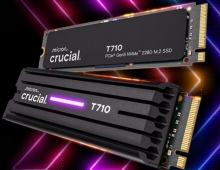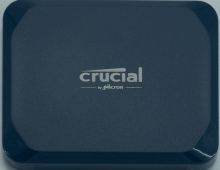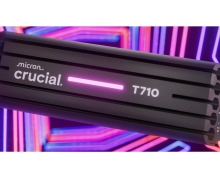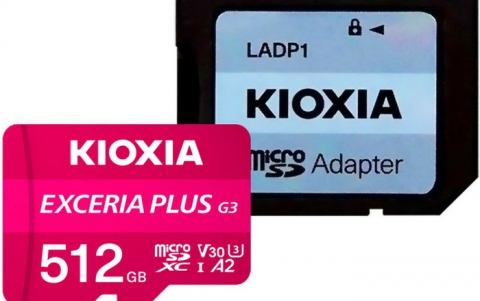Crucial M550 512GB SSD Review
1. Features
Crucial has just released its latest the Crucial M550 SSD series, which offers capacities up to 1TB and is available in three different form factors - 2.5-inch, mSATA, and M.2. The 2.5-inch version is available in 128 GB (CT128M550SSD1), 256 GB (CT256M550SSD1), 512 GB (CT512M550SSD1), and 1 TB (T1024M550SSD1) versions, while the more compact mSATA, and M.2 M550 SSDs come with 128GB, 256GB and 512GB flavours.
The M550 SSD series uses Micron's 20nm MLC NAND and the company's 128Gbit MLC NAND die. It treats all files the same, regardless of whether they’re compressed or uncompressed, promising to offer 550 MB/s sequential reads across all file types.

Today we will test the 2.5-inch, 512 GB M550 SSD. The drive uses a Marvell 88SS9189 controller SATA 6Gb/s controller that’s fueled by Crucial's own custom firmware.
As a member of the M550 series, the SATA version features Native Write Acceleration, a more efficient and dependable way to write data, along with Adaptive Thermal Protection technology, to help users avoid overheating, even when they overwork it.
Developed by Micron's engineers, the Native Write Acceleration technology promises to deliver consistently fast write performance. This technology spreads the drive's workload across several elements, and links the controller, custom firmware, and flash storage components together.
Adaptive thermal monitoring enables the SSD device to operate in a wide variety of environments by helping to prevent the host computer from running at excessive temperatures. The technology reduces write data throughput to about 150MB/s when the temperature sensor reaches 78°C. Performance will be reduced by approximately an additional 50% as the temperature hits higher points at 82°C, 85°C, and 88°C. Read rates are also reduced. While this is occurring, DRAM refresh rates are increased by a multiple of 4, in order to provide increased data integrity when the drive is operating above the temperature specification. The SSD remains in this lowered performance state until the temperature returns to 65°C; the SSD then returns to normal operating mode.
The thermal monitoring feature is enabled by default, but it can be disabled using ATA SET FEATURE commands.
Micron’s SSDs incorporate advanced technology for defect and error management. They use various combinations of hardware-based error correction algorithms and firmware-based static and dynamic wear-leveling algorithms. Over the life of the SSD, uncorrectable errors may occur. An uncorrectable error is defined as data that is reported as successfully programmed to the SSD but when it is read out of the SSD, the data differs from what was programmed. The M550 2.5-inch SSD has an Uncorrectable Bit Error Rate of less than 1 sector per 1015 bits read. And the SSD achieves a mean time to failure (MTTF) of 1.5 million hours.
The endurance for the SSD can be predicted based on the usage conditions applied to the device, the internal NAND component cycles, the write amplification factor, and the wear-leveling efficiency of the drive. Micron calculates that the 512GB drive has a lifetime of 72TB - almost 40 GB/day for 5 years.
As a self-encrypting drive (SED), the Crucial M550 also incorporates the FIPS-compliant, AES-256 encryption into the controller, allowing the drive to operate at full speed without the performance loss associated with software-based encryption. The self-encypting drive (SED) features a FIPS-compliant, AES-256 encryption engine. In order to make your password more secure, the M500's firmware is TCG Opal 2.0 and IEEE-1667 compliant. The TCG Opal support lets you leverage third party encryption tools to more securely lock down your system.Both these compliances also make the M550 compatible with Microsoft's eDrive standard. This means the M500 possibly the first drive that can be used to enable the BitLocker under Windows 8.
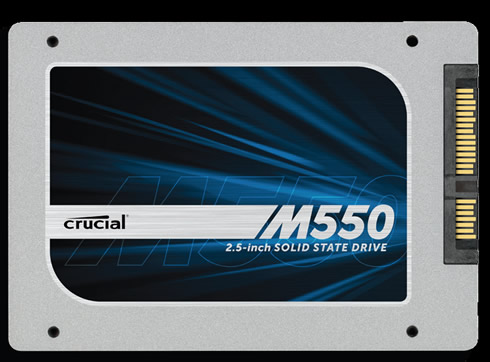
Features M550 2.5-Inch SATA NAND Flash SSD
• Micron 20nm MLC NAND Flash
• SATA 6 Gb/s interface
• TCG/Opal 2.0-compliant self-encrypting drive
(SED)
• Compatible with Microsoft eDrive
• Hardware-based AES-256 encryption engine
• Industry-standard, 512-byte sector size support
• Hot-plug/hot-remove capable
• Device sleep (DEVSLP), extreme low-power mode
• Native command queuing support with 32-command
slot support
• ATA-8 ACS2 command set compliant
• ATA security feature command set and password
login support
• Secure erase (data page) command set: fast and secure
erase
• Sanitize device feature set support
• Self-monitoring, analysis, and reporting technology
(SMART) command set
• Adaptive thermal monitoring
• Power loss protection for data-at-rest
• Performance
- PCMark Vantage (HDD test suite score): Up to
90,000 - Sequential 128KB READ: Up to 550 MB/s
- Sequential 128KB WRITE: Up to 500 MB/s
- Random 4KB READ: Up to 95,000 IOPS
- Random 4KB WRITE: Up to 85,000 IOPS
- READ/WRITE latency: 5ms/25ms (MAX)
- MTTF: 1.5 million device hours
- Static and dynamic wear leveling
- Uncorrectable bit error rate (UBER): <1 sector
per 1015 bits read
512GB, 1024GB
• Secure firmware update with digitally signed firmware
image
• Operating temperature: Commercial (0°C to +70°C)




